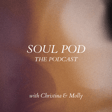
6.5. Intentionality In Our Relationship - A Soul Pod Bonus
As we had no real framework to follow, establishing our relationship was a journey through uncharted territory that both of us have found to be deeply transformative. Join us as we discuss what it has been like to figure out what we are to each other, and what it means to us to be in a soul pod.
We're so grateful you're here! If you like what you’re hearing, you can find more exclusive content on Patreon: www.patreon.com/soulpodthepodcast. We can’t wait to see you over there!
You can also follow us on Instagram: @soulpodthepodcast, or email us directly at soulpodthepodcast@gmail.com.
Hosts: Christina Bell & Molly Wilde
Music: The Confrontation, by Jonathan Boyle, licensed from Premium Beats by Shutterstock
Editing: Molly Wilde
Disclaimer: The purpose of this podcast is for entertainment and enjoyment. We are not professionals in any regard. We do not have professional knowledge, training, or education in physical health, mental health, or spiritual matters. Any suggestions or recommendations made during our episodes should be independently researched by the listener before considering implementation, or better yet, listeners should ignore everything we say. We cannot be held responsible or liable for anything we say, or any actions taken by any persons as a result of listening to our podcast episodes. Stay safe, stay informed, stay smart.
